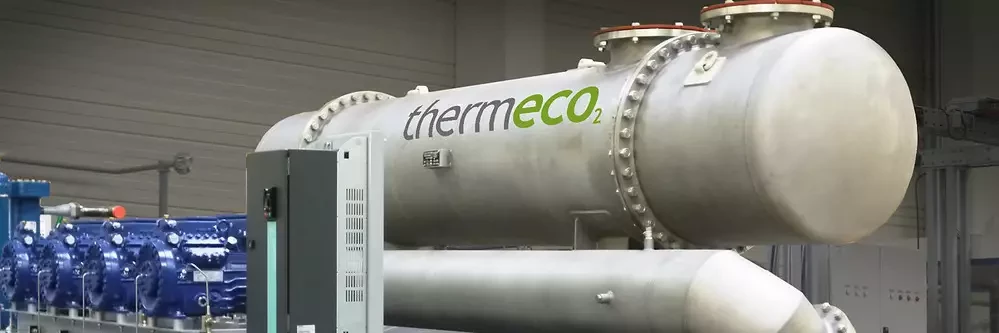The HCFC refrigerant R22 is harmful to the environment, and may be used only until the end of 2014. The widely used CFC refrigerant R134a also is not environmentally ideal, because its Global Warming Potential (GWP) value is 1,300 times that of CO2.
Refrigerant systems operating with harmless CO2 are therefore a reliable alternative over the long term. With this knowledge, Volkswagen placed an order with thermea for the first compressed air dryer from the thermeco2 series ADR (Air Dryer with Reciprocating compressor) – with the option of delivery of more dryers by 2014.
In terms of technology, the CO2 refrigerant dryer is based on the proven thermeco2 heat pump series from thermea. Whether in centralized or decentralized medium supply systems, the climate-friendly technology ensures reliable treatment of compressed air in automotive plants.
Natural refrigerant provides advantages to the operator
From an operator's viewpoint, CO2 is the ideal refrigerant.
Because CO2 is climate neutral and is not subject to any special testing and documentation requirements, periodic leakage tests at the responsibility of the operator are now a thing of the past. By deciding in favor of carbon dioxide, plant operators gain the certainty of not having to make any replacement investments in the long term due to a changed legal framework. Usage bans such as for R22 or rising demands on operators as included in the F Gas Regulation are not possible with CO2.
CO2 also fares well when compared to other natural refrigerants, e.g. ammonia or flammable hydrocarbons, thanks to its classification in the lowest safety group A1. It is non-combustible, and few demands are placed on the safety technology. Simple installation is a decisive benefit when compared to the other available natural refrigerants, especially when compressed air dryers are operated in densely configured production facilities.
Cost advantages through heat recovery
A technological innovation of the thermea systems positively affects operating costs. With the thermeco2 refrigerant dryers, heat energy extracted from the compressed air during the condensation process can possibly be recovered for the first time. By using this energy, operators require less primary energy to produce heat for the production process. The CO2 emissions can be reduced in addition to the omission of chiller units operated with F gases, improving the sustainability of production in two respects.
Heat recovery is made possible by the transcritical process management of the CO2 refrigerant. This permits flow line temperatures of up to 90 °C to be reached. thermea has for years been using transcritical process management for its high-temperature heat pumps and has now adopted the process in refrigerant dryer technology.
A calculation example illustrates the reduction in the primary energy requirements and emissions: A car manufacturer operating a thermeco2 ADR refrigerant dryer with a volumetric flow rate of 22,100 m3 per hour saves 136,000 m3 of natural gas at a heating power of 305 kW and reduces CO2 emissions by 305 metric tons – solely through the use of the recovered heat energy.
The table below shows which heating power values – depending on dryer type – can be recovered by dehumidification of the compressed air.
Dryer type | Heating power | Natural gas savings | CO2 savings |
[kW] | [m³/a] | [t/a] | |
ADR 3300 | 45 | 20,000 | 45 |
ADR 4400 | 60 | 27,000 | 60 |
ADR 5500 | 75 | 33,000 | 75 |
ADR 7600 | 105 | 47,000 | 105 |
ADR 11100 | 150 | 67,000 | 150 |
ADR 16600 | 230 | 103,000 | 230 |
ADR 22100 | 305 | 136,000 | 305 |
ADR 30800 | 425 | 189,000 | 425 |
ADR 41000 | 565 | 251,000 | 565 |
ADR 61200 | 840 | 374,000 | 840 |
ADS 46100 | 715 | 318,000 | 715 |
Nominal point according to ISO 7183:
Compressed air dew point 3 °C; cooling water inlet tW..E = 25 °C, cooling water outlet tW..A= 80 °C – ADR series
Compressed air dew point 3 °C; cooling water inlet tW..E = 25 °C, cooling water outlet tW..A= 70 °C – ADS series
4,000 operating hours/a
Annual rate of utilization of the boiler system 0.81, referred to the upper calorific value Hs
Conversion from kWh to m³: 11.1 kWh/m³
Operational reliability through flexible recooling
Recooling systems are frequently operated at capacity limit when outdoor temperatures are high. The thermeco2 refrigerant dryers also offer advantages here. The option of high-temperature heat extraction under summer recooling conditions can be used in a targeted manner. The transcritical process management easily allows the cooling water outlet temperatures from the refrigerant dryer to be increased gradually to 50 °C and higher. This ensures reliable operation of the robust refrigerant dryers, even under difficult recooling conditions.
Thermeco2 refrigerant dryers are available in eleven power ratings. Capacities range from 3,300 m³/h (45 kW heating power) to 61,200 m³/h (840 kW heating power). thermea systems are built on a project-specific basis, making them readily adaptable to suit individual customer requirements. Examples include special materials and special designs for heat exchangers with contaminated media or air-cooled gas coolers/condensers. Diverse interfaces with the Simatic-S7 control system of the dryers can be implemented, as well as halogen- and silicone-free switchgear or power control via frequency converters. Several refrigerant dryers can also possibly be connected in parallel.

